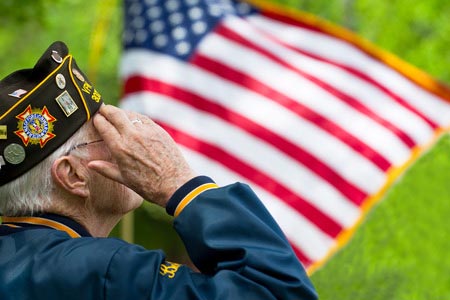 The VA’s Little-Known Veterans’ Pension Benefit
The VA’s Little-Known Veterans’ Pension Benefit
Retired military wartime veterans and surviving spouses of deceased wartime veterans may qualify for a helpful, but often underutilized, benefit—a special monthly pension benefit called Aid and Attendance—provided through the Department of Veterans Affairs (VA). Even though the program has existed for some time, many veterans are unaware that they may qualify.
The Aid and Attendance pension is potentially available to wartime veterans and surviving spouses who receive in-home care, or who live in assisted living communities. To qualify, applicants must be incapable of self-support and require consistent personal assistance.
If you or your loved one have been denied VA benefits in the past, you may still qualify for Aid and Attendance. Veterans and surviving spouses whose incomes are above the congressionally mandated legal limit for a VA pension can qualify provided they have large medical expenses, such as nursing home expenses, and do not receive reimbursement for those costs.
According to the VA, claimants must meet at least one of the following core requirements:
• The applicant requires the aid of another person in order to perform personal functions required in everyday living, such as bathing, feeding, dressing, attending to the wants of nature, adjusting prosthetic devices, or protecting oneself from the hazards of their daily environment.
• The applicant is bedridden, in that their disability or disabilities requires that they remain in bed apart from any prescribed course of convalescence or treatment.
• The applicant is a patient in a nursing home due to mental or physical incapacity.
• The applicant’s eyesight is limited to a corrected 5/200 visual acuity or less in both eyes; or concentric contraction of the visual field to 5 degrees or less.
To qualify for the monthly benefit, the wartime veteran or surviving spouse must be at least 65 years old or officially disabled if younger, they must have served at least 90 days of active military service, including at least one day during a period of war (not necessarily in combat), and were discharged under conditions other than dishonorable. A surviving spouse must have been living with the veteran at the time of their death and must be single at the time of the claim.
If all of the above requirements are met, the VA determines eligibility for the Aid and Attendance benefit by adjusting for non-reimbursed medical expenses from the veteran’s or surviving spouse’s total household income. If the remaining income after those medical expenses is less than the annual income threshold for Aid and Attendance, the VA pays the difference between the applicant’s income and the Aid and Attendance threshold.
The Aid and Attendance income threshold for a veteran without dependents as of 2017 is $21,531 annually. The threshold increases to $25,525 if a veteran has one dependent, and by $2,205 for each additional dependent. As of 2017 the annual Aid and Attendance threshold for a surviving spouse alone is $13,836.
Veterans and surviving spouses may apply for Aid and Attendance by writing to the Pension Management Center (PMC) that serves their state. Applicants can also visit their local regional benefit office to file a request. Claimants can locate their local regional benefit office using the VA Facility Locator.
Applicants should include copies of any evidence, preferably a report from an attending physician validating the need for Aid and Attendance care. The report should be in sufficient detail to determine whether there is disease or injury producing physical or mental impairment, loss of coordination, or conditions affecting the ability to dress and undress, to feed oneself, to attend to sanitary needs and to keep oneself ordinarily clean and presentable.
The report should also indicate how well the applicant gets around, where the applicant goes and what he or she is able to do during a typical day. In addition, it is necessary to determine whether the claimant is confined to the home or immediate premises.
Eddy Senior Living is proud to welcome military veterans and their spouses to our assisted living communities. To learn more about how we can accommodate you, please request more information or call us at 877-748-3339.
